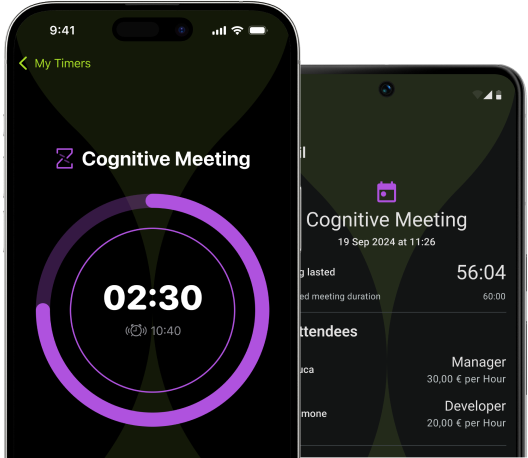Business meetings are a fundamental tool for communication and collaboration within an organization. However, when not managed effectively, they can become a significant obstacle to efficiency and productivity. The proliferation of unfocused and ineffective meetings not only wastes valuable time but can also cause frustration among employees, reduce morale, and compromise overall company performance. Every minute spent in an unproductive meeting is a lost opportunity to focus on more strategic and impactful tasks.
In this article, we will explore the main risks associated with poor management of business meetings, analyzing how they can negatively affect efficiency. We will also provide practical solutions and strategies to ensure that every meeting contributes meaningfully to achieving corporate goals.
The Risks of Poor Time Management in Meetings
Unfinished Projects
One of the most evident risks of inefficient business meetings is project stagnation. Poorly managed or overly long meetings often result in inconclusive discussions that fail to lead to concrete decisions or practical solutions. This slows progress and causes projects to stall, as teams are unable to complete tasks within deadlines.
When participants are not focused on the main objectives and discussions drag on without tangible outcomes, projects risk remaining incomplete, with a negative impact on deadlines and overall work quality.
Missed Deadlines
Inefficient meetings often overrun their allotted time, disrupting other activities and intruding on time set aside for other tasks. This leads to disorganized time management, which in turn contributes to missed deadlines. Delays that accumulate in a meeting directly affect project deliveries and business planning.
Missed deadlines have a direct impact on productivity, with negative consequences both internally and externally, as clients experience a service that fails to meet initial commitments.
Client Dissatisfaction
When a company wastes time in unnecessary and poorly organized meetings, the quality of service provided to clients suffers. Project delays and lack of progress updates can compromise client relationships, eroding trust and reliability. In a competitive market, meeting deadlines is crucial to maintaining customer satisfaction.
An unsatisfied client may not only stop doing business with the company but also spread negative feedback that damages brand reputation.
Team Friction
Poorly structured and confusing meetings create fertile ground for misunderstandings and conflicts among team members. The absence of a clear agenda and defined objectives can lead to miscommunication between departments, generating friction among colleagues. Business meetings should be a tool for collaboration, but when mismanaged, they can instead exacerbate internal divisions.
Misunderstandings increase tension, reduce team cohesion, and compromise collaboration across departments, hindering the achievement of common goals.
Unproductive Discussions
Many business meetings are characterized by lengthy discussions about irrelevant details that fail to produce concrete decisions. These unproductive discussions not only waste time but also generate growing frustration among participants. The lack of clear objectives and an action plan renders meetings ineffective, with the risk that participants lose interest and fail to contribute actively.
Meetings without clear purpose or outcomes are one of the main obstacles to corporate efficiency and contribute to poor use of human resources.
Increased Overtime
When meetings drag on without productivity, team members end up compensating for the lost time outside working hours. This leads to increased overtime, which negatively impacts employee well-being. Burnout and fatigue caused by excessive workloads are a direct result of poor meeting management.
Inefficient meetings not only undermine productivity but also affect employee morale, reducing motivation and engagement.
How Efficient Time Management Benefits the Company
Increased Productivity
Well-managed business meetings can become a powerful tool for improving productivity. When meetings are short, focused, and goal-oriented, teams save time and achieve tangible results. Reducing the number of unnecessary meetings frees up time for more productive tasks, improving overall business efficiency.
An effective meeting allows participants to concentrate on priority tasks and make quick decisions, enhancing workflow and goal achievement.
Better Cross-Department Collaboration
Well-structured meetings promote communication across departments. With short and focused meetings, teams can align on common goals, improving cross-department collaboration. Clarity in discussions and efficient time management facilitate cooperation between different business functions, improving overall results.
Rapid information sharing during concise meetings speeds up decision-making processes, reducing waiting times and misunderstandings.
Focus on Results
When meetings are short and well-organized, participants are more motivated to concentrate on concrete goals. Limited time encourages productivity and decision-making focused on final outcomes, rather than drifting into unproductive discussions. This approach allows companies to remain focused on strategic objectives and avoid diversions that slow progress.
Better Resource Management
Optimizing meeting time allows better use of corporate resources, both human and material. When meeting time is reduced and well spent, employees have more time to focus on other productive activities. Efficient meeting management contributes to a better allocation of resources, ensuring that every team member can dedicate themselves to their tasks without unnecessary interruptions.
How Long Is Too Long? The Ideal Meeting Duration
The paradox of long meetings is that beyond a certain limit, they become counterproductive. Meetings lasting more than an hour tend to reduce productivity, with participants’ attention and focus declining. The concept of “snackable” meetings — short 15-30 minute sessions — is increasingly popular in modern companies, as they maintain high levels of concentration and productivity.
The Benefits of Shorter Meetings
Short meetings, in addition to improving efficiency and focus, also ensure better use of human resources. With limited time, participants are encouraged to focus on the main topics, reducing the risk of distraction and increasing active participation. Moreover, shorter meetings maintain higher energy and interest levels, preventing frustration or disengagement among attendees.
Best Practices to Optimize Business Meetings
Do’s:
- Always prepare and share a clear agenda in advance.
- Limit participation to only those strictly necessary.
- Be concise and aim for concrete results.
- Use modern technologies to simplify management (e.g., project management tools and videoconferencing).
Don’ts:
- Don’t postpone important decisions.
- Avoid holding meetings for every small detail.
- Don’t overload participants with too many topics.
In conclusion, effective management of business meetings is crucial for improving efficiency and productivity within an organization. Short, focused, and well-managed meetings save time, enhance collaboration among teams, and keep attention on strategic goals. Implementing best practices to optimize meetings not only leads to tangible results but also contributes to a more positive and motivating work environment. Investing time in organizing and managing business meetings is a fundamental step to optimizing resources and ensuring long-term success.




